|
Music Reviews
Alternative
Blues
Books
Christmas
Classic Rock
Country
Jazz
Lounge
Oldies
Power Pop
Punk & New Wave
Reggae
Rhythm & Blues
Seventies
Texas
Special Features
Randy's Rodeo
Sex Pistols
Motown
Halloween
Valentine's Day
Information
About Me
Feedback
Links
User's Guide
Support Me
Amazon
iTunes
Sheet Music Plus
|
Sock it to me, Santa! Visit my other website, www.hipchristmas.com Visit my other website, www.hipchristmas.com
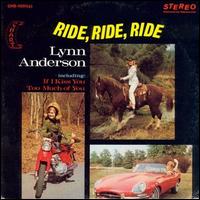 It
is all but impossible to discuss the music of Lynn
Anderson without first considering her biggest hit, "Rose Garden." Casual
listeners, in fact, may think of Anderson as a one-hit wonder, despite the fact that
she charted 60 country singles, including a couple dozen Top 10's and five #1 smasheroos.
But "Rose Garden" was Anderson's sole pop Top 40 entry, and let's face
it: it's a hell of a record. Written by Joe South ("Games People Play")
and produced by Glen Sutton (Lynn's then-husband), "Rose Garden" was a
crossover tour de force, blending a galloping beat and swelling strings
with Anderson's uptown twang. Rarely in the annals of country music has the public
at large embraced a pure product of Nashville so completely. Backed by the considerable
clout of Columbia Records president Clive Davis, Lynn Anderson's "Rose Garden" rose
to #3 on the pop charts in 1970 during the heyday of acid rock, earning the flaxen-haired
beauty a Grammy for Best Female Country Vocal Performance. It
is all but impossible to discuss the music of Lynn
Anderson without first considering her biggest hit, "Rose Garden." Casual
listeners, in fact, may think of Anderson as a one-hit wonder, despite the fact that
she charted 60 country singles, including a couple dozen Top 10's and five #1 smasheroos.
But "Rose Garden" was Anderson's sole pop Top 40 entry, and let's face
it: it's a hell of a record. Written by Joe South ("Games People Play")
and produced by Glen Sutton (Lynn's then-husband), "Rose Garden" was a
crossover tour de force, blending a galloping beat and swelling strings
with Anderson's uptown twang. Rarely in the annals of country music has the public
at large embraced a pure product of Nashville so completely. Backed by the considerable
clout of Columbia Records president Clive Davis, Lynn Anderson's "Rose Garden" rose
to #3 on the pop charts in 1970 during the heyday of acid rock, earning the flaxen-haired
beauty a Grammy for Best Female Country Vocal Performance.
But "Rose Garden" was just the most visible moment in a long and storied
career. Born in North Dakota and raised in California, Lynn Anderson distinguished
herself as an equestrian and a beauty ("California Horse Show Queen of 1965")
before the age of 20. Her parents were both musicians, with her mother Liz being
a songwriter of some repute, having penned "Strangers" for Merle Haggard.
These influences (and her family's inside connections) got young Lynn signed to a
record deal with independent Chart Records in 1966. Before long, Lynn Anderson had
a considerable string of hits behind her - more often than not, songs written for
her by her mother - and she even scored a weekly TV gig - on The
Lawrence Welk Show!
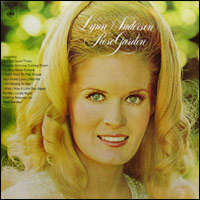 These
early Chart recordings (spanning 1966 to 1969) are really wonderful, harnessing Lynn's
precocious alto behind a sprightly, vigorous, Bakersfield-derived, hard-core country
sound. Lynn's first hit, "Ride Ride Ride" (1966) was written by Liz Anderson
to capitalize on her daughter's equestrian achievements, and it christened a prolific
ten year span that saw Anderson releasing over 30 albums (counting reissues, repackages,
and hits collections). The thing is, most of them were good - even when
Anderson was merely covering hits for LP filler, she shone. Her rendition of "I've
Been Everywhere" (Hank Snow, 1962) is masterful, and her revival of "Rocky
Top" (Osborne Brothers, 1968) is absolutely definitive. A lot of that can be
chalked up to the voice God gave her; not a terribly expressive singer, Lynn Anderson
is nevertheless a supremely confident one - and technically adept, to boot. No matter
what she's singing, you believe her, and that's the mark of great singers from Al
Jolson to Bono. These
early Chart recordings (spanning 1966 to 1969) are really wonderful, harnessing Lynn's
precocious alto behind a sprightly, vigorous, Bakersfield-derived, hard-core country
sound. Lynn's first hit, "Ride Ride Ride" (1966) was written by Liz Anderson
to capitalize on her daughter's equestrian achievements, and it christened a prolific
ten year span that saw Anderson releasing over 30 albums (counting reissues, repackages,
and hits collections). The thing is, most of them were good - even when
Anderson was merely covering hits for LP filler, she shone. Her rendition of "I've
Been Everywhere" (Hank Snow, 1962) is masterful, and her revival of "Rocky
Top" (Osborne Brothers, 1968) is absolutely definitive. A lot of that can be
chalked up to the voice God gave her; not a terribly expressive singer, Lynn Anderson
is nevertheless a supremely confident one - and technically adept, to boot. No matter
what she's singing, you believe her, and that's the mark of great singers from Al
Jolson to Bono.
Though "Ride Ride Ride" was her first hit, it was "If I Kiss You
(Will You Go Away)" that really put her on the map. The latter single (from
her debut LP, Ride
Ride Ride, 1967) reached #5 on the country charts, then two Top 10 hits from
her sophomore album, Promises
Promises (1968), pushed that record to #1 on the country album charts. Chart
Records conspired to keep Anderson in the public eye, releasing a dozen or so singles
and half as many albums in a mere four years - then a bunch more from their backlog
after she bolted to the majors. Produced with restraint but verve by steel guitarist
Lloyd Green, these Chart recordings should rightfully be Lynn Anderson's legacy,
but they are often overlooked. To staunch fans, however, they are the essence of
Lynn Anderson - unabashedly country, hungry, and proud.
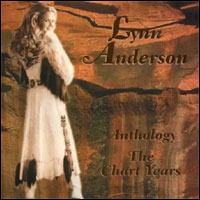 In
addition to an obvious Buck Owens flavor, Lynn Anderson's music to this point evidenced
the influence of country's reigning queens. Female country singers of the day were
stepping out from traditional female roles, beginning to assert their authority,
and demanding their love rights. Songs like "The Pill" (Loretta Lynn), "Your
Good Girl's Gonna Go Bad" (Tammy Wynette), and "Just Because I'm A Woman" (Dolly
Parton) bucked hard against chauvinistic male expectations. Many such songs - like
Wynette's "Stand By Your Man" or Anderson's own "He Even Woke Me
Up To Say Goodbye" - were, on the surface, models of female passivity. But,
they engendered a blunt sexual honesty that announced a new era was dawning. Add
to this a growing acceptance of country music - both among the middle class and
the hippie cognoscenti - and the pump was primed for the monumental success
of "Rose Garden." Joe South's lyrics laid out a 'shape up or ship out'
scenario that, when sung by a woman, presented a rousing tale of liberation. In
addition to an obvious Buck Owens flavor, Lynn Anderson's music to this point evidenced
the influence of country's reigning queens. Female country singers of the day were
stepping out from traditional female roles, beginning to assert their authority,
and demanding their love rights. Songs like "The Pill" (Loretta Lynn), "Your
Good Girl's Gonna Go Bad" (Tammy Wynette), and "Just Because I'm A Woman" (Dolly
Parton) bucked hard against chauvinistic male expectations. Many such songs - like
Wynette's "Stand By Your Man" or Anderson's own "He Even Woke Me
Up To Say Goodbye" - were, on the surface, models of female passivity. But,
they engendered a blunt sexual honesty that announced a new era was dawning. Add
to this a growing acceptance of country music - both among the middle class and
the hippie cognoscenti - and the pump was primed for the monumental success
of "Rose Garden." Joe South's lyrics laid out a 'shape up or ship out'
scenario that, when sung by a woman, presented a rousing tale of liberation.
More importantly, after switching to Columbia Records, Lynn Anderson began to
embrace the "countrypolitan" sound that was sweeping Nashville. Countrypolitan,
developed by producers like Billy Sherrill (a frequent songwriting partner of Glenn
Sutton) and singers like Eddy Arnold, emphasized slick
arrangements and universal themes over down-home pickin' and rural imagery. But
Anderson's first Columbia sides were simply revved up versions of what she had
recorded for Chart. "Stay There 'Til I Get There" is pure country, and "No
Love At All" is a terrific folk-tinged romp recalling Bobbie Gentry. Both
singles were major country hits, but "Rose Garden" (the title song from
her third Columbia LP) changed the stakes. The record was the best sort of countrypolitan
- identifiably country and cosmopolitan - but Anderson's later records
became more of the former and less of the latter to the detriment of the whole.
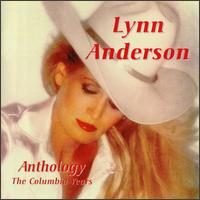 That
said, many great singles emerged from this second phase of Lynn Anderson's career,
and she matured demonstrably as a singer. Some of my favorites are "How Can
I Unlove You" (1971), a Joe South-penned track strongly reminiscent of "Rose
Garden;" the sophisticated "Fool Me" (1972); the torch ballad "Keep
Me In Mind" (1973); and a rendition of the Carpenters' "Top
Of The World" (1973) that gives the song a homespun authenticity the original
sorely lacked. On the pop charts, Lynn Anderson charted eight albums (including
a Greatest Hits and a double-LP reissue of her two pre-"Rose
Garden" Columbia platters) and six singles during the first half of the 70's,
though none were major hits. On the country charts, meanwhile, she reigned supreme,
pretty much living in the Top 10 during the same period. The Glenn Sutton-penned "What
A Man My Man Is" (1975) was her last #1 country single, but she continued
to perform well through the rest of the decade, aging gracefully as the increasingly
mercenary country market outgrew her. That
said, many great singles emerged from this second phase of Lynn Anderson's career,
and she matured demonstrably as a singer. Some of my favorites are "How Can
I Unlove You" (1971), a Joe South-penned track strongly reminiscent of "Rose
Garden;" the sophisticated "Fool Me" (1972); the torch ballad "Keep
Me In Mind" (1973); and a rendition of the Carpenters' "Top
Of The World" (1973) that gives the song a homespun authenticity the original
sorely lacked. On the pop charts, Lynn Anderson charted eight albums (including
a Greatest Hits and a double-LP reissue of her two pre-"Rose
Garden" Columbia platters) and six singles during the first half of the 70's,
though none were major hits. On the country charts, meanwhile, she reigned supreme,
pretty much living in the Top 10 during the same period. The Glenn Sutton-penned "What
A Man My Man Is" (1975) was her last #1 country single, but she continued
to perform well through the rest of the decade, aging gracefully as the increasingly
mercenary country market outgrew her.
After she left Columbia in 1981, Lynn scored just a few more minor hits. After
such a busy stretch, she understandably rested on her laurels, claiming the title "The
Great Lady Of Country Music." Nearly all big country stars get a title - the
Man In Black (Johnny Cash), the Singing Ranger (Hank Snow), the First Lady of Country
Music (Tammy Wynette), the Southern Gentleman (Sonny James), the Texas Troubadour
(Ernest Tubb). You get the picture.... Anyway, in the 90's Lynn Anderson began
to cut the occasional album, usually for smaller labels. These included the western-themed Cowboy's
Sweetheart (1992), Live
At Billy Bob's Texas (2000), and The
Bluegrass Sessions (2004), which recast her hits in that tradition. More recently,
she's been involved in some unfortunate incidents (public intoxication, shoplifting)
that have threatened to make her "The Courtney Love of Country Music." Regardless,
Lynn Anderson's musical legacy remains intact.
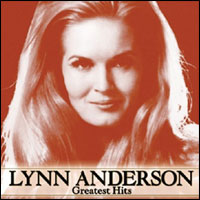 Like
many country stars from the 70's, Lynn Anderson's CD catalog is in some disrepair.
Very few of her original LP's (none from the Chart Records era) have ever been
reissued on disc, and Columbia has done very little to preserve her legacy (16
Biggest Hits stands out). In 1999, however, indie label Renaissance Records
released two Anthology discs
- one of The
Chart Years and another of The
Columbia Years - that approached perfection. The former features every one
of Anderson's charted Chart singles, plus rarities like "Keeping Up Appearances" (a
duet with now-forgotten singer Jerry Lane) and liner notes by Lynn's tunesmith
mother. The latter installment is even more hit-laden, and Lynn wrote the liner
notes herself. Like
many country stars from the 70's, Lynn Anderson's CD catalog is in some disrepair.
Very few of her original LP's (none from the Chart Records era) have ever been
reissued on disc, and Columbia has done very little to preserve her legacy (16
Biggest Hits stands out). In 1999, however, indie label Renaissance Records
released two Anthology discs
- one of The
Chart Years and another of The
Columbia Years - that approached perfection. The former features every one
of Anderson's charted Chart singles, plus rarities like "Keeping Up Appearances" (a
duet with now-forgotten singer Jerry Lane) and liner notes by Lynn's tunesmith
mother. The latter installment is even more hit-laden, and Lynn wrote the liner
notes herself.
Renaissance folded soon thereafter, however, and both volumes are dolefully out-of-print
and sorely missed. Happily, Collector's Choice Records' 24-track Greatest
Hits (2005) does much to remedy that situation. Essentially a one-disc version
of the Renaissance series, Greatest
Hits is inevitably less comprehensive but wonderful all the same. Highly, highly
recommended. (Much later, Sony issued The Essential Lynn Anderson, a superb 40-track collection available only as download.)
Beyond the hits, however, the pickings are slim. Lynn Anderson's rabid fan base
will no doubt purchase everything available - budget reissues, latter-day rerecordings,
locks of hair, whatever. The rest of us will have to be satisfied with Collectables' Golden
Classic Edition, pairing Rose
Garden (1970) and You're
My Man (1971), two of Anderson's strongest and most popular Columbia LP's.
Generally speaking, Collectables Records is a low-rent outfit, but one has to hope
they (or somebody - Sundazed? Collector's Choice? Rhino? Bear Family? - will resume
reissuing Lynn's voluminous back catalog. She deserves better. For now, curious
collectors must seek out the original vinyl. [top of page]
 Selected Lynn
Anderson Albums Selected Lynn
Anderson Albums
[top of page]
 Essential Lynn
Anderson Songs Essential Lynn
Anderson Songs
- All The King's Horses (1976)
- Beggars Can't Be Choosers (1967)
- Big Girls Don't Cry (1968)
- Cry (1972)
- Even Cowgirls Get The Blues (1980)
- Flattery Will Get You Everywhere (1968)
- Fool Me (1972)
- He Even Woke Me Up To Say Goodbye (1971)
- He Turns It Into Love Again (1975)
- He'd Still Love Me (1969)
- How Can I Unlove You (1971)
- I'm Alright (1970)
- I've Never Loved Anyone More (1975)
- If I Kiss You (Will You Go Away) (1967)
- Keep Me In Mind (1973)
- Keeping Up Appearances (1967)
- Listen To A Country Song (1972)
- Mother, May I (with Liz Anderson, 1968)
- No Another Time (1968)
- No Love At All (1970)
- Our House Is Not A Home (If It's Never Been Loved In) (1969)
- Paradise (1975)
- Promises Promises (1967)
- Ride Ride Ride (1966)
- Rocky Top (1969)
- Rose Garden (1970)
- Smile For Me (1974)
- Stay There 'Til I Get There (1970)
- Talkin' To The Wall (1974)
- That's A No No (1969)
- Top Of The World (1973)
- What A Man My Man Is (1974)
- You're My Man (1971)
[top of page]
 Lynn
Anderson On The Web Lynn
Anderson On The Web
[top of page]
 Feedback Feedback
Your witty comments, impertinent questions, helpful suggestions, and angry denials
are altogether encouraged. Submit feedback via email;
submissions will be edited and posted at my discretion.
|
|